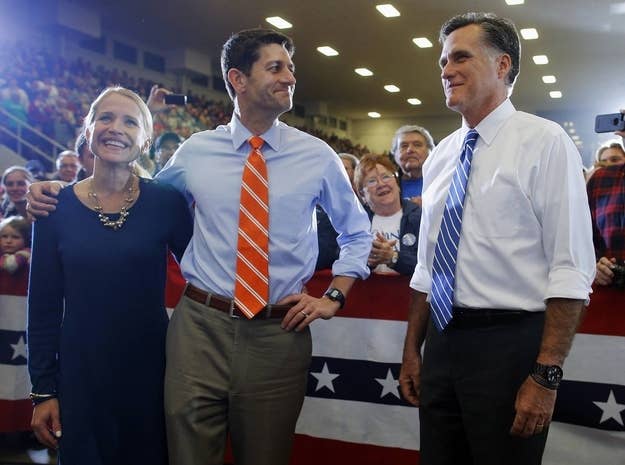
CELINA, Ohio — Paul Ryan has been cast as a conservative hero and a leader in Capitol Hill's bitter partisan wars, but as Mitt Romney carries a new message of bipartisanship to gymnasiums across Ohio, he has also given his running mate a new role: aisle-crossing compromiser.
"One of the things that impressed me is how much the people on the other side of the aisle have respect for him," Romney told a crowd here early in the day. "He put his [Medicare] plan together with another piece of legislation that is now called the Ryan-Wyden bill. And Wyden is a Senator from Oregon, a Democrat, he worked across the aisle."
It was a point Romney would make repeatedly in his barnstorming tour across Ohio Sunday. In the same speech he said Ryan would help him "change the way Washington is working." At the next stop, in Findlay, he devoted more time to talking up Ryan's reputation on the Hill as a good-faith negotiator. And in his final speech of the day, in Marion, Romney used his running mate's experience in Congress to remind supporters, "By the way, Democrats love America too."
Eleven weeks ago, it would have been hard to imagine Romney spending the final days of the race pointing to Ryan as proof of his commitment to compromise. Indeed, when the Congressman was first tapped to join the ticket in August, it was widely viewed — inside the campaign and out — as a move to excite the Republican base, and reshape the election into a sharp ideological choice between President Obama's "government-centered society," and the Republicans' free market ideals.
But Ryan's new role shows just how far the campaign has evolved in the past three months — and how committed Boston is to its Moderate Mitt strategy.
In the days and weeks after announcing their veep pick, the campaign sought to embrace Ryan's role as an intellectual leader on the right, while simultaneously shedding his association with the deeply unpopular institution of Congress.
That meant preaching the principles of his government-slashing budget plan without going into details about the fraught bureaucratic process he wen through to craft it. He was a nearly 20-year veteran of Capitol Hill trying to run as a sort of outsider.
For example, at a town hall two weeks ago in Youngstown, Ohio, a woman asked Ryan why Congress hadn't passed a balanced budget amendment to the Constitution.
"You know why," he responded, exasperatedly. "Because politicians are being politicians."
And perhaps most notably, as Politico reported, his aides pushed for the candidate to be referred to during the vice presidential debate as "Mister Ryan," instead of "Congressman Ryan." (The request never made it into the formal pre-debate agreement and Ryan spokesman Michael Steel maintained that "there was no such stipulation in the memorandum of understanding" prior to the debate.")
But in the home stretch of the race, the campaign's treatment of Ryan's record has conspicuously shifted. In Ohio, Romney wasn't introducing his running mate as a conservative crusader with big ideas, but rather as an earnest public servant who was eager to solve problems by working with the other side.
Senior Romney adviser Kevin Madden told BuzzFeed the campaign was able to rejigger its message because they had effectively beaten back Democrats’ early efforts to cast Ryan — with his controversial Medicare plan — as a ruthless granny-killer. As it has turned out, the issue has not proven to be a drag on the senior vote that many thought it would.
“You had partisans whose job it is to attack Republicans giving you a distorted view of Paul Ryan and his record on Capitol Hill,” he said.
With that obstacle overcome, the campaign is now seizing the opportunity to use Ryan’s Congressional career to their advantage.
“Anyone who’s worked up there for a long time knows how serious he is, and how he’s always been focused on confronting some of the big challenges we’ve faced,” Madden said. “As this campaign progresses, we not have the opportunity to talk about that, and it helps with a lot of swing voters.”
In many ways, Ryan's new role is a return to his persona of the early Obama years: An earnest conservative frustrated in his quest for compromise, before that word was banished from the capital. And indeed, longtime aides to the Congressman said the stump rhetoric wasn't so much a recasting, as it was a re-emphasis on Ryan's true record.
“It’s something Gov. Romney has mentioned any number of times when they are together, starting on the announcement day,” said Steel. “That obviously goes to the fact that Gov. Romney worked in Massachusetts with a legislature that was 85 percent Democratic and Congressman Ryan has a record as a reformer in Congress.”

